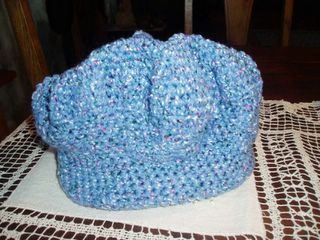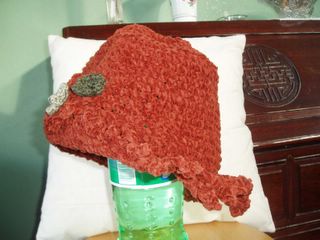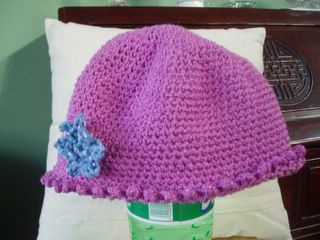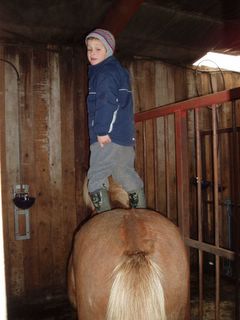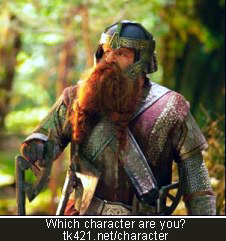So, just some words so everybody sees that I am still alive and well. Tomorrow Valur and me are flying to Lissabon to visit my parents over eastern. So beside of crocheting two more hats I had a lot to do, but everything is ready now, my hair newly cut and the bath is waiting. Up again at 4:50, and tommorow evening I will be sitting on a nice patio and sip white wine in degrees over –1; while I know that my daughters are taking care of my house, car, son and flowers. What a wonderfull life!
I wish everybody a nice holiday and maybe I write you from Portugal.
Claudia, I didn’t forget your birthday, I just didn’t take care of the date. So, happy birthday!! And your son phoned me by accident the other day, so I could congratulate him.
Bye and bless und bald wieder.
Wednesday, March 16, 2005
Wednesday, March 09, 2005
Tuesday, March 08, 2005
Sunday, March 06, 2005
I forgot
to tell you about the icelandic outdoors swinmming pools. If you have once tried them out, you won't want to swim anywhere else. Of course the hot springs feed them and you will find a comfortable warm swimming pool in every crummy place and between them, used in summer and winter. All of them have a hot pot too, with, or without bubbles. It's great. The biggest and best known hot pool however is the "blue lagoon", world wide known through excellent adversitsing. There the tourists go, yes and some icelanders too, I don´t, for reasons I am not going to tell.
I would like to tell you about Iceland. If you look at a map of the world, it is this little duck like island down to the right under Greenland. There should be a change of name. Iceland is very green and Greenland is rather icy. When about 1000 years ago the first settlers arrived at Iceland from the east, as they came from Norway, the first thing they saw was the biggest glacier in Europe, the “Vatnajökull” and called it “Ice”land. They should just have waited with this name-giving around the next corner, there it gets green and lushy. Greenland on the other hand was one of the big advertisements in the old days. They wanted people to settle there in the time of the vikings and called it Greenland, thereby promising grass and meadows for the animals.
Iceland has a rather mild, oceanic climate, getting softnes from the “Golfstream”, a warm arm of ocean which streches all the way north fom the mexican golf. Fishes like this, so there is great fishing here and was the main industry for a long time and still is. In the last decades we got aluminium factories, precision fabrication, software production. And on a small scale whatever you ask for. We can look proudly of having produced two times the Miss World, the strongest man in the world and the singer Björk. We got a small filmindustrie, music groups which are famous around the world, the leader of the football team Chelsea in Great Britain. We got theater, opera, ballet, art exibitions. And all that out of a population of 284.000, the size of a nice suburb abroad.
We are one of the 5 richest country in the world. We got more cars per person than the americans. Everybody down to 10 years old has at least one handy. Computers are at most homes and often more than one. And so on.
Our speciality: hot water. Here we got these hot springs, springing up wherever you want (no, not really). Springing up in many places. When I was a kid I was terrified and fascinated to drive through Hveragerði. Then the roads were only mud tracks and in the middle of the road there would be these little hot springs bubbling and gurgeling. Some years ago they had to move out of a house there as there was suddenly a little geysir in the basement. Of course we also have some earthquakes and vulcano eruptions from time to time, that comes in the package.
So, most of the icelandic homes are heated by hot water. It is transported in pipelines and has the confortable temperature of about 70 degree C when it reaches the ofens. It is also used as tap water and has a slightly sulforic smell. Some of the energy of the hot water and steam is also used to produce electricity but mostly the huge amount of electricity we can consume is generated from rivers.
Half of the population of Iceland lives in and around the capital Reykjavík. In the north is a town, Akureyri and the rest live in fishing villages or as farmers around the cost. The middle of the land is wilderness: glaciers, stones, sands, waterfalls, more and more visited by tourists.
Saturday, March 05, 2005
Monday I will go and get me an icelandic passport. The news: after living more than thirty years in Iceland I finally decided to become icelandic officially. Up to two month before I have been german. I haven´t been to Germany in 15 years. So I found it a necessary step to become icelandic. And I am proud of it. Iceland is a great country and my home. I like to make statements. When I decided that I really didn’t believe in the teaching of the church I went and resigned. I don´t like to be a follower in something that I don’t believe in. Some people around me laugh at this. It is important for me.
We are a quite wildly european family, splattered from Germany to Iceland, Portugal, Norway, mixed with a bit of Kurd and Israel. One summer at home we had to juggle between six languages. I took part in three. Me, that is german, english and icelandic. I can safe myself in french. Monika brought russian with her. So, we will go quite a way. We even know a chinese young man. He could help us out, too, if it should prove life saving.
The last week passed extremely quickly. Just managed my work from monday to wednesday, thursday I fetched Marinó from school and then he went shopping with Monika what he loved. I went to my painting class and finished two pictures. I took photos of them to show you, but on those pictures my paintings died. So, I will try to take better photos some time later. Now I am once, once, once again cleaning my house … and in between crocheting hats.
All the teachers at our school are dicussing this spring two afternoons the week the concept of teaching. We listen to invited specialists, discuss in little groups and as the time goes on ideas seem to be cristallizing how we would like the school to be, the interaction, the learning, the teaching, the assessing. It gets more interesting every week. Many of the teachers are dissatisfied with the school as it is today and many brilliant ideas for changes are emerging.
In our special class we have tackeled this problem often: What is the most important thing for our students to learn in the timeframe that is given? Do they need to learn to handle money when they can use credit cards? Do we spent time teaching them to calculate when they can use a calculator? In the exams they don´t use calculators, somebody argues. Then, isn’t it time to change the examinations? When, in real life, do you have to translate without a dictionary? Should our children attend class to get them to interact with their peers or should we teach them how to interact with peers through stories in a safe environment? Everytime you do something with the children you set a question mark behind it. It can change yearly, weekly, daily. Luckily the opinions of the teachers differ. That makes it possible to go a rather safe middleway. What do children from today have to be able to do tomorrow? What do you know, maybe there will not be electricity tomorrow and they should learn to make a fire with a stick. Read Doris Lessing’s “Memoirs af a survivor” and you know what I mean.
Friday, March 04, 2005
ramblings
I am reading a book my parents gave me for my birthday and, sorry, I am quite unhappy with it. It is a german book and the words in it are so bombastic, high level and intellectual that I have to read every sentence twice just to get it’s meaning. I like clear, simple language which says what it has to say and then shuts up. This book is written by Ruediger Safranski and is about the great german poet Schiller. Here the biographer is trying to top the poet, but does not get it. Schiller is great because he is, still now since 1770 and something, simple, understandable, moving and exciting. Safranski isn’t and will therefore not come into the ring of great writers, however hard he tries.
I have come as far as a complicated interpretation of philiosophers of the late eighteenth century, 1750-1800 or so about. Why do I get so impatient reading this? Their ideas might be fascinating and great, I couldn´t tell. But, when they ramble on about the position of man in nature, the world and the universe, think about what they did not yet know. It was before the french revolution, Goethe wrote that the white colour was the purest one –no, let’s keep it short- he got this whole colour-prism thing wrong, it was 100 years before Darwin wrote the “origin of man”, it was still longer untill Freud wrote stupid things about the human psyche and a long, long time before brain scanning and gene research –and results-, so were does this put us now? Is the view of the human being as it was through the greek classik, the middleage through to the last century still relevant for others than historicans?
I feel like when keeping ourselves in the past and the old ideas we are not ready to look at and cope with the problems of today. Not only the science but the idea of science has changed tremendously in the last hundred years and will surely keep on changing dramatically in the future in ways we can’t imagine. Different to the old times when there were a few elected talking in latin about the world these changes touch now every single individual on the globe. Why for example should we nowadays study Marx’s “Das Kapital”? We know that his and Lenins ideas didn’t work. Is there anything more to say about it? It was tried out and didn´t succeed but cost thousands of people’s lives. Anyhow, the interactions in the world have gotten far to complicted for that simplicistic model.
On a much lower level we are discussing these problems at my school. How and what to teach our children. Should we still teach them facts? Or ways to access knowledge? But more about that later.
